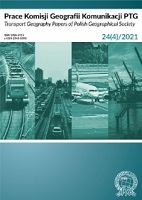Problematyka tranzycji do zrównoważonej mobilności w badaniach polskich miast
Sustainable mobility transitions agenda in the scientific research of Polish urban areas
Author(s): Maciej TarkowskiSubject(s): Policy, planning, forecast and speculation, Rural and urban sociology, Economic development, Transport / Logistics
Published by: Wydawnictwo Uniwersytetu Jagiellońskiego
Keywords: sustainable mobility; sustainable development; transition studies; geographies of transition; urban area; Poland;
Summary/Abstract: The research on the sustainability transitions – a fundamental change in socio-technological systems consisting in increasing the degree of sustainability of production and consumption processes – gained significant dynamics in the second decade of the 21st century, manifested by the expansion and integration of the research community and the growth of article numbers. As part of this trend, the geography of sustainability transitions has emerged. It explains how and why transitions are similar or different across locations. The article’s main aim is to outline the socio-technological perspective of the geographical research on sustainable urban mobility and place within it the achievements of research on Polish cities. Literature studies were bidirectional: (i) identifying possible applications and benefits that the concept of sustainability transitions provides to mobility research in Polish cities, (ii) analysing of peer-reviewed scientific articles published in the Transport Geography Papers of Polish Geographical Society on urban mobility in the context of the identified geographic factors of transitions. The study outcomes showed the dominance of the shift in modal split framed by formal visions, strategies and development policies. The significance of this issue resulted from the importance of public transport in research on transport geography and the dependence of transportation branches on local authorities. The insertion of the analysed achievements within the framework of the multi-level perspective showed that the vast majority of the works concerned the functioning of socio-technological regimes rooted in the structures of cities. The marginal treatment of the macro-level (socio-technological landscape) and the micro-level (innovation in niches) and focusing on selected regularities in the functioning of regimes resulted in a narrowing of the time perspective of the research. A particular challenge for the study of transport geography seems to be the issue of reducing transport needs and its impact on the spatial structure and the functioning of urban transport systems and mobility patterns. The breadth of the issues of transition paths towards sustainable mobility seems to favour the integration of a new, administratively separated scientific discipline, which is socio-economic geography and spatial management. In practical terms, it inspires the territorialisation of development policies.
Journal: Prace Komisji Geografii Komunikacji PTG
- Issue Year: 24/2021
- Issue No: 4
- Page Range: 41-56
- Page Count: 16
- Language: Polish

